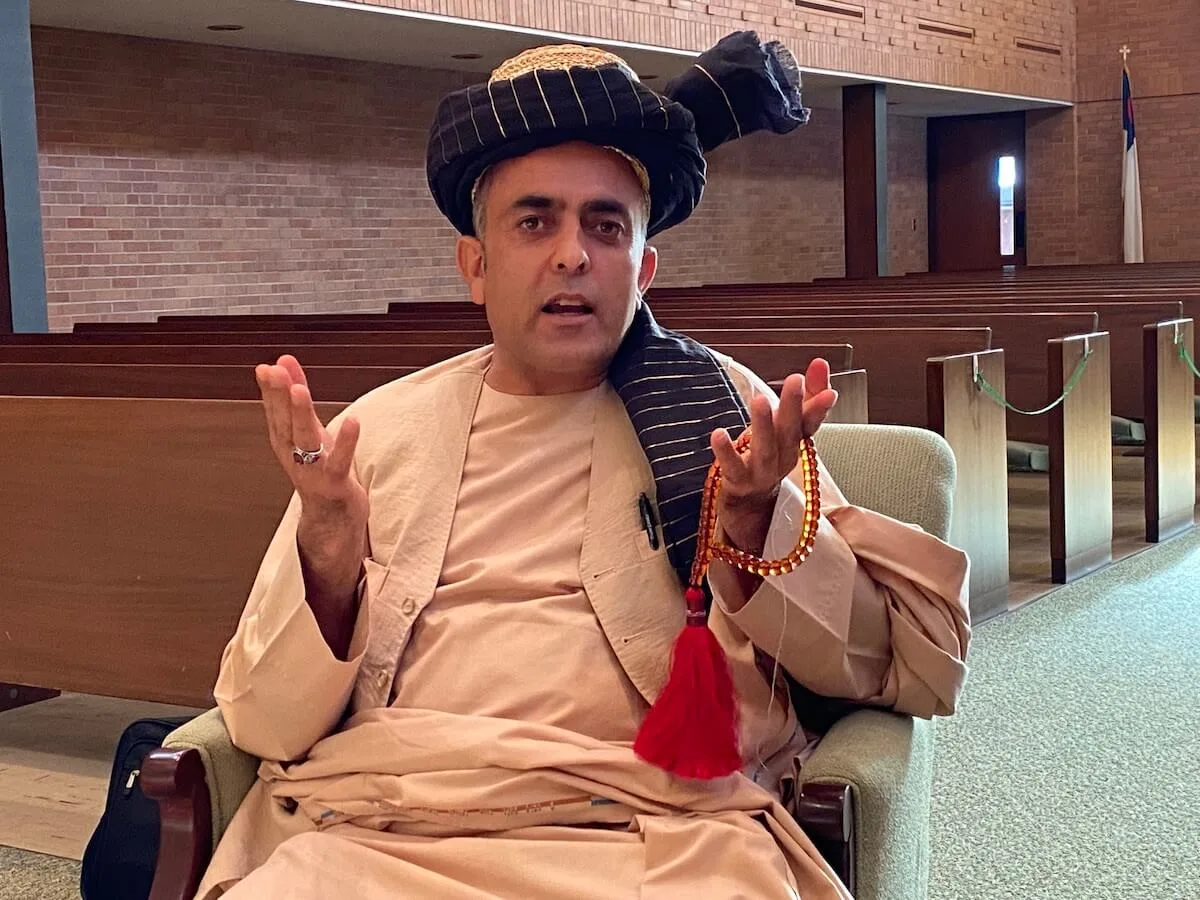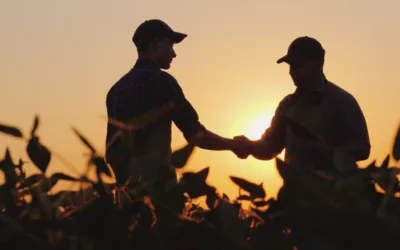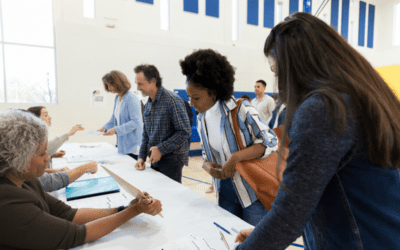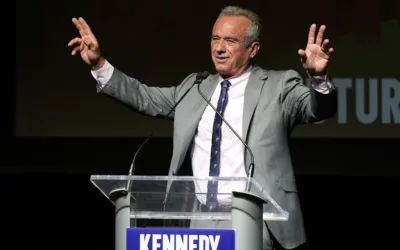
Matiullah Matie fled his native Afghanistan in August after his work with Americans there endangered his life when the Taliban took control of that nation. Matie and his family are one of two Afghan refugee families to have settled in Wausau so far. That number is expected to grow in upcoming weeks. (Photo by Julian Emerson)
Matiullah Matie and his family have made it to Wausau after a perilous escape from the Taliban.
As soon as Matiullah Matie saw the men with weapons gathered outside the door of his home in Kabul, Afghanistan, he knew his life was in danger.
One of the men asked for Matie. Realizing they were members of the Taliban that was retaking Afghanistan’s capital city along with seizing control of the rest of the country, Matie redirected them.
“He lives down there, three streets over,” Matie said, pointing away from his home.
The men looked at him, hesitated, then left for the other home. Swallowing his panic, Matie grabbed his AK-47 rifle in case they returned. The scary encounter on this August night convinced Matie he and his family had to leave their native country.
Matie, 40, was a tribal leader, a prominent man in his community. A businessman, he had worked with Americans during their occupation of the Helmand Province of Afghanistan. He spoke publicly on behalf of American soldiers and their efforts, urging his countrymen to assist in the opening of schools, stores, and medical clinics. He helped oversee the construction of a government center building.
Then the Taliban surged across Afghanistan in August, taking control from government forces in the wake of the US government announcing its military withdrawal from the country. Afghans like Matie, who had worked with Americans and had spoken in favor of them, were in deadly peril from the authoritarian Taliban.
RELATED: With Afghan Refugees, Wausau Gets Chance to Show Welcoming Side
Matie had already relocated his family to Kabul two years earlier because of danger posed by the Taliban. Now that deadly threat had come to his front door.
Matie said the Taliban had killed one of his relatives as they marched toward Kabul. One day after the first encounter at his home, they returned. As they yelled outside, calling for his death, Matie said he, his wife, and six children ages 3 to 16 fled out another entrance.
Matie knew his family’s only chance was to make it to the Kabul airport and get a flight out of the country. But doing so would be perilous.
Wearing a mask to conceal his face, Matie and his family navigated Kabul’s crowded, chaotic streets, making their way through several Taliban checkpoints, each one a danger to their lives. At one, they were detained for nearly a full day, during which they had little water amid stifling temperatures. At another they watched as Taliban soldiers fired rubber bullets and tear gas into crowds of citizens.
“We were so worried they would figure out who we were,” Matie recalled of that harrowing experience. “It was so hard. We were afraid for our lives. We knew what would happen if we were caught.”
Seeking to Help
Nearly 7,000 miles away, the Rev. Rebecca Voss watched with concern as Taliban troops descended on Kabul. She cringed at video footage of Afghan citizens flooding the Kabul airport, desperate to escape and fearful of the future.
Five months earlier, during an online Bible study meeting among church members at the First United Methodist Church of Wausau she oversees, attendees had proposed making Wausau a place where refugees could resettle. The city had a history of resettling Hmong residents in past decades, and community members thought doing so again, perhaps with Latino residents seeking refuge in this country, would be a natural extension of the church’s mission.
“I saw a desire to widen our embrace of our people who are not white who have different perspectives and come from different cultures,” Voss recalled of that meeting. “I wanted to get a sense of what we could do to help people understand the richness that comes from being a more diverse community.”
The refugee resettlement idea gained steam, and with the assistance of local and federal government officials, Voss and others backing the idea learned the process required to make Wausau a resettlement destination. Among those requirements was garnering the approval of the US State Department, which would determine whether Wausau had the necessary support services to help refugees find success.

A review during the summer determined that support existed, and a local nonprofit, New Beginnings for Refugees, formed and worked with a new refugee resettlement office overseen by the Ethiopian Community Development Council.
At first those agencies were told they would receive refugees from one of a half-dozen countries. Then, after the Taliban took control of Afghanistan, Wausau was designated as a site where refugees from that nation would be resettled.
“We were all waiting to see what country the refugees would come from. Then the situation in Afghanistan happened,” Voss said.
Matie was one of more than 100,000 people who escaped Afghanistan—13,000 of whom were temporarily housed at Fort McCoy in Wisconsin, where about 7,000 remained as of December, according to the Wisconsin State Journal—and are now being resettled across the country. Matie and his family came to Wausau from Fort Pickett, Virginia.
‘We Made It’
As Matie’s family faced a lengthy stay at a Taliban-controlled checkpoint, their hope wavered. Even if they made it through the last of the checkpoints, how would they be noticed by US military amid the streets teeming with people hoping to get into the airport?
In 2009, when he lived in Afghanistan’s Helmand Province, Matie had befriended Maj. Michael Kuiper, executive officer of the 3rd Battalion, 6th Marine Regiment that occupied the area at that time. The two men had remained in contact in years since, a vital factor in helping Matie and his family escape Kabul.
After Matie’s family made it through the last Taliban checkpoint, they attempted to draw the attention of US soldiers guarding the airport while avoiding recognition by the Taliban. A battalion in Kuiper’s regiment guarded the airport, and Matie was able to contact Kuiper on his phone.
Matie said he was told to use a code word, and military personnel eventually located his family amid the crowd and brought them inside the airport to safety. Even amid the emotional upheaval of being forced from their home and facing an uncertain future, Matie said he and his family felt a momentary sense of relief.
“We made it. We made it. My family is safe,” a relieved Matie said.
Making a Commitment
On Aug. 27, Matie and his family flew to Qatar, and from there to Germany, where they stayed for a time before they arrived at Fort Pickett. They lived there with other Afghan refugees for a couple of months, during which they were vaccinated against COVID-19 and other illnesses and underwent extensive background checks.
In Wausau, New Beginnings for Refugees and the Ethiopian Community Development Council worked diligently to prepare for Afghan refugees. They scrambled to hurriedly put together resources at the end of August when they were told they would receive refugees, only to have that timeline delayed.
“That was really like a fire drill for us,” said Gwen Paul, New Beginnings for Refugees’ executive director. “We were talking a lot, getting organized, saying ‘Can we do this?’ ”
During ensuing months those agencies have continued their work, collecting clothing, furniture, and other items refugee families will need. While challenges remain, Paul said she is heartened by the outpouring of support for refugees, in donations and otherwise.
“It has really been great to see this community come together for this cause,” she said.

‘All One People’
On Dec. 29, Matie and his family stepped off of an airplane into the frigid air at the Wausau airport into their new home. A crowd of about 30 people was there to greet them, cheering and waving signs of support.
“It felt amazing to have that support,” Matie said. “That was never anything that we expected. It shows the beauty of the people of Wausau.”
Just two hours earlier the city’s first Afghan refugees, a family of four, had arrived. Matie’s family was scheduled to be the first; the other family, headed by an Afghan military official, showed up earlier than scheduled.
They are the first Afghan refugee families to arrive in Wausau, but that number will grow soon. Refugee resettlement officials said five additional refugee families are expected to arrive in Wausau next week and five more the week after.
In the meantime, Matie and his family continue to adapt to life in their new home. So much is different from the lives they knew: the culture, language, food, weather. Nearly everyone in their new world is white. Virtually nothing seems familiar.
Matie acknowledged difficulties associated with their new life. He hopes the surrounding community accepts them and other refugees and treats them well, but he doesn’t know if that will happen. He wonders what he will do for a job, how his family will adapt. He worries about extended family still in Afghanistan.
But he remains optimistic, thankful for a new life, thankful for his American friends, thankful to simply be alive.
“It is not about our differences. We are all one people,” he said. “We want peace. And that seems possible here.”

This billionaire’s PAC is spreading a big lie about Tammy Baldwin, Medicare, and taxpayer savings
Restoration PAC, funded by Uline’s Richard Uihlein, twists the significance of forcing Big Pharma to negotiate for lower bulk pricing on Medicare...

New Biden rules deliver automatic cash refunds for canceled flights, ban surprise fees
In the aftermath of a canceled or delayed flight, there’s nothing less appealing than spending hours on the phone waiting to speak with an airline...

Opinion: It’s time for Congress to fight for small businesses instead of big corporations
May is National Small Business Month. Our elected leaders need to show leadership all year long. For the past 27 years I’ve been fortunate to pursue...

Biden makes 4 million more workers eligible for overtime pay
The Biden administration announced a new rule Tuesday to expand overtime pay for around 4 million lower-paid salaried employees nationwide. The...




